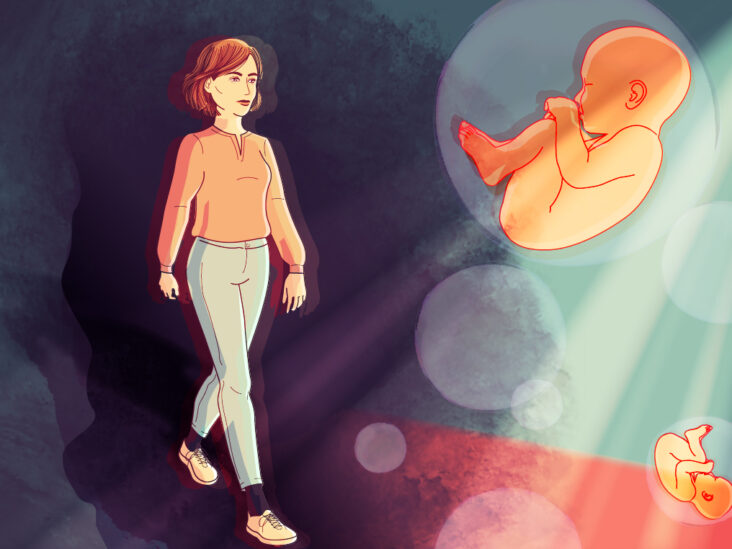Bipolar disorder is a mental illness that can cause extreme mood swings. Many people with bipolar disorder are able to lead normal lives when they are taking medication and getting treatment. However, there is one time during life when bipolar disorder can become a huge challenge – pregnancy. If you are pregnant and have bipolar disorder, it is important to get the right information and treatment so that you can have a healthy pregnancy and baby. In this blog post, we will discuss the symptoms of bipolar disorder during pregnancy, how to get help, and what to expect.
Contents
Defining Bipolar Disorder
Bipolar disorder, also known as manic-depressive disorder, is a mental illness that causes extreme mood swings. These mood swings can range from feeling very high and energetic (manic) to feeling low and depressed (depressive). Most people with bipolar disorder will experience both extremes at different times in their lives. For some people, these mood swings can be mild. But for others, they can be so severe that it interferes with everyday life.
Bipolar disorder can be of various types. All of the types involve manic and depressive episodes. But the type, number, and severity of these episodes can vary from person to person. Bipolar I is characterized by at least one manic episode that lasts for seven days or more (or by a manic episode so severe that hospitalization is necessary). Bipolar II is characterized by at least one depressive episode lasting for two weeks or more, as well as at least one hypomanic episode (a less severe form of mania). Cyclothymia is a milder form of bipolar disorder that involves periods of hypomania and depression that last for at least two years.
Bipolar Disorder and Pregnancy
Pregnancy can be a difficult time for any woman – even without a mental illness. There are so many changes happening in your body, and you may feel like you are out of control. If you have bipolar disorder, these changes can trigger manic or depressive episodes.
Some ways the bipolar symptoms influence pregnancy include:
- Making it difficult to take care of yourself or your baby
- Putting you at risk for preterm labor or miscarriage
- Increasing the chance of having a low birth weight baby
- Making it hard to bond with your baby after birth
There is also a huge risk of bipolar extending into postpartum bipolar disorder. This is another category of bipolar disorder which means having manic or depressive episodes after giving birth. This can pose more difficult challenges because you are also dealing with a new baby. It can also be difficult to get the help you need because you may be too busy taking care of your baby. Some of the effects of postpartum bipolar include:
- Not being able to take care of your baby
- Having thoughts of harming yourself or your baby
- Depression that lasts for weeks or longer
If you are pregnant and have bipolar disorder, it is important to get help right away. There are many resources available to help you manage your illness and have a healthy pregnancy.
Symptoms of Bipolar Disorder During Pregnancy
There are several symptoms of bipolar disorder that can occur during pregnancy. These include:
- Feeling extremely happy or “high” (manic)
- Having lots of energy and not being able to sleep (insomnia)
- Talking faster than usual and having racing thoughts
- Acting impulsively and doing things that are out of character
- Feeling very depressed
- Having no energy and wanting to sleep all the time (fatigue)
- Losing interest in things that you used to enjoy
- Having difficulty concentrating
- Feeling hopeless or helpless
- Having thoughts of suicide
As we can observe, there is not much difference in symptoms of regular bipolar and bipolar during pregnancy. However, some women may find that their symptoms are worse during pregnancy. This can be due to the hormonal changes that occur during pregnancy.
If you are experiencing any of these symptoms, it is important to seek help from a mental health professional. They will be able to diagnose you and provide the necessary treatment.
Treatment for Bipolar Disorder During Pregnancy

There are several treatment options available for bipolar disorder during pregnancy. These include:
Medication
Medication is the most common form of treatment for bipolar disorder. If you are taking medication for bipolar disorder and become pregnant, it is important to speak with your doctor about the risks and benefits of continuing your medication. Some medications can be harmful to a developing baby, so it is important to make sure that the benefits of the medication outweigh the risks. Some of the most common prescription drugs include:
- Lithium
- Valproic acid
- Carbamazepine
- Olanzapine
- Quetiapine
- Risperidone
- Ziprasidone
- Aripiprazole
- Asenapine
Make sure to be in timely and regular contact with your healthcare provider to monitor the effects and benefits of medicines on your condition.
Psychotherapy
Psychotherapy, also known as talk therapy, can be helpful in treating bipolar disorder. This type of therapy can help you understand your illness and how to manage your symptoms. It can also provide support and guidance during difficult times. Some of the most commonly effective therapeutic interventions include:
- Cognitive-behavioral therapy
- Family-focused therapy
- Interpersonal and social rhythm therapy
Hospitalization
In some cases, hospitalization may be necessary. This is usually only done if you are experiencing a severe manic or depressive episode and are a danger to yourself or others. Herein, the mother and baby will be monitored closely and given the necessary care. This also ensures that the mother is getting the treatment she needs.
Electroconvulsive Therapy
Electroconvulsive therapy (ECT) is a treatment that involves passing electrical currents through the brain to trigger seizures. ECT has been found to be an effective treatment for bipolar disorder, and it is generally safe to use during pregnancy. It is important to speak with your doctor about the risks and benefits of this treatment before deciding if it is right for you.
Lifestyle Changes
There are some lifestyle changes that can help manage bipolar disorder during pregnancy. These include:
- Staying on a regular sleep schedule
- Eating a healthy diet
- Exercising regularly
- Limiting stress
- Avoiding triggers
- Limiting alcohol and drug use
- Getting support from family and friends
- Making sure to take your medication as prescribed
Pregnancy can be a difficult time for women with bipolar disorder. However, there are treatment options available that can help manage the symptoms. If you are pregnant and have bipolar disorder, make sure to speak with your doctor about the best way to manage your condition. With proper treatment, you can have a healthy pregnancy.
Conclusion
Pregnancy can be a difficult time for women with bipolar disorder. The signs and consequences of the illness can be very harmful to both the mother and the developing baby. However, with proper treatment, women with bipolar disorder can have healthy pregnancies. If you are pregnant and have bipolar disorder, make sure to speak with your doctor about the best way to manage your condition. With proper treatment, you can have a fruitful pregnancy.
For more information, please contact MantraCare. Bipolar disorder is a mental illness characterized by extreme shifts in mood, energy, and activity levels. If you have any queries regarding Online Bipolar Disorder Counseling experienced therapists at MantraCare can help: Book a trial Bipolar Disorder therapy session


